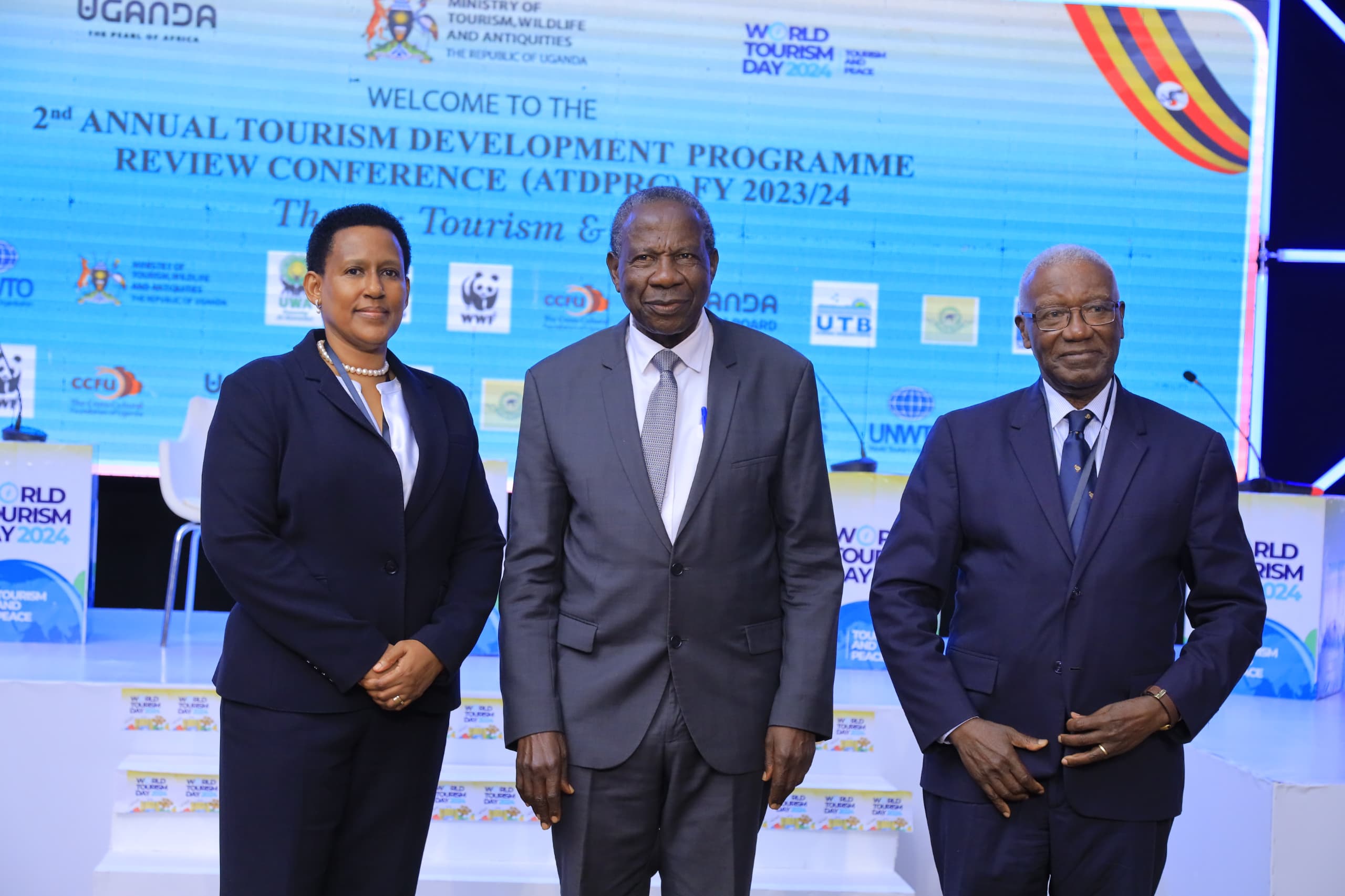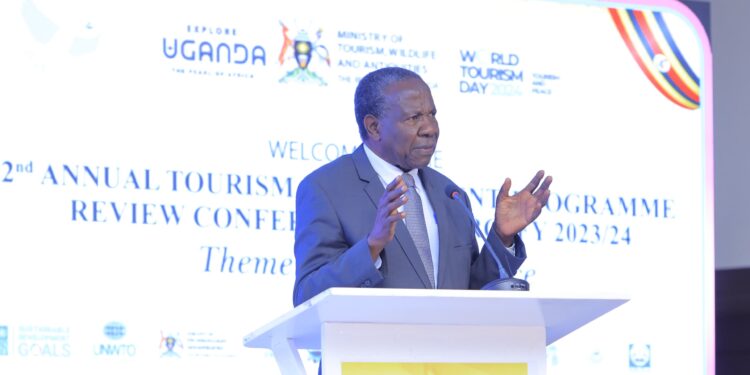At the 2nd Annual Tourism Development Programme Review Conference for FY 2023/24, Uganda’s Minister of Finance Planning and Economic Development, Matia Kasaija, emphasized the crucial role of tourism in driving the country’s socio-economic transformation, as outlined in Uganda’s Vision 2040.
In his address at the event held at Hotel Africana Kampala on Thursday, Minister Kasaija urged stakeholders in the tourism sector to advance their commitment towards the sector, which has been identified as a key growth pillar in transforming Uganda from a peasant society to a modern and prosperous nation.
“Uganda’s Vision 2040 provides a 30-year strategic direction for the country and identifies tourism as one of the sectors with high potential to harness the country’s socio-economic transformation. “A Transformed Ugandan Society from a Peasant to a Modern and Prosperous Country within 30 years,” he said.
Kasaija highlighted that between FY 2020/21 and 2024/25, Uganda has invested over Shs. 2.9 trillion in tourism. This investment has resulted in impressive growth and resilience, with the country recovering 82.6% of its pre-pandemic international tourist arrivals by the end of 2023. Visitor numbers surged to 1,274,210 in 2023, up from 814,508 in 2022, demonstrating the sector’s rapid recovery. Additionally, international tourism receipts grew by 48.5%, reaching Shs. 3.819 trillion in 2023, compared to Shs. 2.57 trillion in 2022.
Tourism businesses’ compliance with national and international service standards also improved, rising from 34% to 55%. “Tourism Development is one of the four key growth areas underpinned by the goal of “full monetization and formalization of the economy, with a focus on increasing tourist arrivals by five-fold under the current spend-per-tourist and length-of-stay”. The target is to generate annual export earnings of US$50 billion.”
Kasaija laid out the government’s future strategies, including improving infrastructure such as roads and ICT at tourism sites, enhancing security, combating negative publicity, and boosting marketing through international consultants. There is also a strong focus on training hospitality professionals, grading tourism facilities, and promoting niche markets like health and education tourism.
The minister also underscored the critical role of Uganda’s Missions Abroad in promoting tourism. Their efforts include scaling up digital marketing, organizing familiarization trips and exhibitions, conducting market research, and facilitating tourist entry with visa assistance.
“With a dedicated budget and the support of various policy instruments such as the Museum and Monument Act of 2023 and the Uganda Wildlife Act of 2019, Uganda’s tourism sector is poised to drive substantial growth. The government has also committed to supporting the private sector through affordable financing options such as the Uganda Development Bank and the Small Business Recovery Fund,” he said.

Kasaija reaffirmed the government’s commitment to unlocking the sector’s full potential through targeted interventions, aiming to transform Uganda into a global tourism powerhouse.
The Permanent Secretary of the Ministry of Tourism, Wildlife and Antiquities Mrs Doreen Katusiime also noted that the performance of Uganda’s tourism industry continues to grow on an upward trajectory. With international tourist arrivals increasing by 56% in 2023, we have achieved an impressive 82% recovery compared to pre-pandemic levels in 2019.”
She noted that this substantial growth underscores not only the resilience of the country’s tourism sector but also its vital contribution to Uganda’s economy. We are seeing increased earnings, more employment opportunities, and higher occupancy rates in our accommodation facilities.
“The remarkable recovery of our tourism industry is a testament to the collaborative efforts of the Ugandan government, private sector, development partners, and civil society organizations. Together, we are successfully promoting Uganda as a premier travel destination. The performance review conference is a crucial platform for us to highlight the progress we have made over the past year. It also provides an opportunity for stakeholders to come together and formulate actionable plans to drive further growth in the upcoming financial year.”
In a bid to enhance and accelerate Uganda’s tourism sector, Minister of Tourism Tom Butime urged “Our goal is to elevate Uganda’s status as a premier tourist destination,” Butime stated. He emphasized that the initiative is centred around strategic marketing and promotion efforts, including the development of a national tourism marketing strategy designed to boost both domestic and international tourism.
Minister Butime highlighted several key advancements: “We have made significant progress in improving our infrastructure and connectivity. This includes the construction of tourism roads, the introduction of new flight routes facilitated by Uganda Airlines, and the expansion of Entebbe International Airport.” He also noted that these efforts are complemented by enhanced conservation measures, which aim to improve the airport’s ambience and support the country’s wildlife-protected areas.
“Our commitment extends to managing 30 wildlife sanctuaries and four Community Conservation Areas, with a dedicated focus on addressing human-wildlife conflicts,” Butime added. The program also emphasizes the development of diverse tourism products across the country, aimed at enriching the visitor experience and ensuring high levels of satisfaction.
Butime underscored that the Tourism Development Program is a result of collaborative efforts across various ministries, departments, and agencies. “This program reflects Uganda’s commitment to a comprehensive approach to development planning. Our objectives include promoting domestic and inbound tourism, improving tourism infrastructure, diversifying tourism products and services, and enhancing the skills and working conditions of personnel in the tourism sector,” he said.
Through these interventions, Uganda aims to create a robust and dynamic tourism industry, ensuring the safety and security of tourists while fostering a sustainable and thriving sector.
Tourist Arrivals to Uganda: Recovery and Trends in 2022-2023
In 2023, international tourist arrivals in Uganda reached 1.674 million, marking a significant increase of 50.49% compared to the 1.08 million arrivals in 2022. This rebound still trails behind the pre-pandemic figures of 2019, which recorded 1.543 million visitors.
Africa remained the dominant source market, contributing 1.136 million visitors (89.2%). Other regions such as Asia and the Pacific (55,975 visitors, 4.4%), Europe (39,506 visitors, 3.1%), the Americas (23,643 visitors, 1.9%), the Middle East (3,983 visitors, 0.3%), and Oceania (2,939 visitors, 0.2%) also had a presence, though smaller in comparison.
In terms of the purpose of the visit, Visiting Friends and Relatives (VFR) was the primary reason for tourists coming to Uganda, constituting 38% of the total in 2022, and 29% in 2023. Business travel remained stable at 15% in 2022 and slightly decreased to 13% in 2023.
Education, which accounted for 10% in 2022, dropped to 6% in 2023. Other purposes such as Meetings, Incentives, Conferences, and Exhibitions (MICE), Religion, and Shopping had more consistent figures across both years, each hovering between 4-8%. Health and Volunteering saw marginal increases in 2023, and the “Others” category expanded from 6% in 2022 to 16% in 2023.
This upward trend in arrivals highlights Uganda’s recovering tourism sector, with a broadening diversification of visitor profiles across different source markets and visit purposes.
In terms of Gross Domestic Product, Exports and Jobs, in 2023 tourism contributed USD 2.8bn (5.5%) towards Uganda’s GDP. Tourism directly contributed 610,000 jobs in 2023. This is about 5.7 per cent of the total employment in Uganda.
Do you have a story in your community or an opinion to share with us: Email us at editorial@watchdoguganda.com









